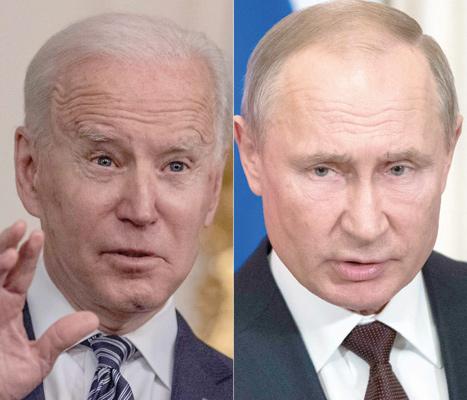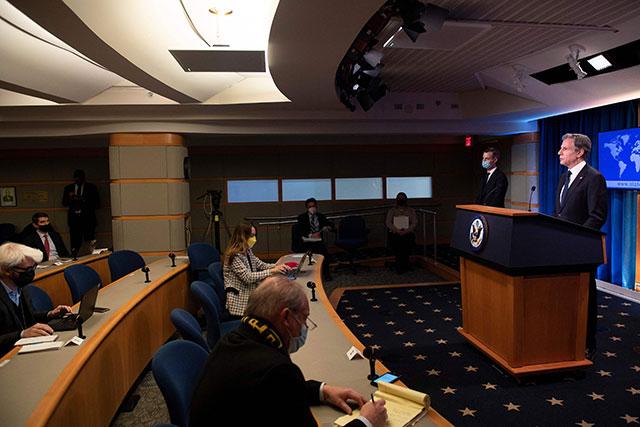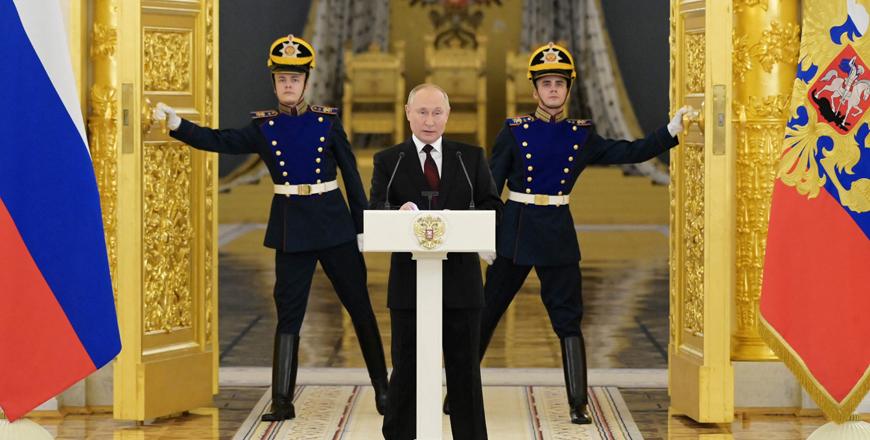You are here
Biden, Putin to hold 1st summit in Geneva
By AFP - May 26,2021 - Last updated at May 26,2021

In this file combination of photos created on March 17 shows US President Joe Biden (left) during remarks on the implementation of the American Rescue Plan in the State Dining room of the White House in Washington, DC, on March 15, and Russian President Vladimir Putin as he and his Turkish counterpart hold a joint press statement following their talks at the Kremlin in Moscow on March 5, 2020 (AFP photo)
WASHINGTON — US President Joe Biden and Russian leader Vladimir Putin will hold their first summit next month in Geneva, both sides said on Tuesday, though no breakthrough is expected in the fraught relationship.
The meeting in the Swiss city will be on June 16, White House Press Secretary Jen Psaki said.
"The leaders will discuss the full range of pressing issues, as we seek to restore predictability and stability to the US-Russia relationship," she said.
The Kremlin confirmed the summit details and said in a statement that Putin and Biden would be discussing "issues of strategic stability," as well as "resolving regional conflicts" and the COVID-19 pandemic.
Biden, making his first international trip as president, will go to Geneva immediately after separate summits with his key Western allies in the G-7, NATO and the European Union.
The face-to-face meeting with the Kremlin leader comes amid levels of tension not seen for years, with Washington now dialling back its ambitions to little more than establishing a relationship in which both sides understand each other and can work together in specific areas.
Unlike in 2009, when Biden was vice president and then president Barack Obama's administration declared a diplomatic "reset" with Putin's government, expectations going into the summit this time are far lower.
And while a high-profile encounter will suit Putin at a time when he faces a largely hostile West, Biden's decision to meet should not be taken as a reward, said a source familiar with summit preparations.
Since taking office, Biden has launched new sanctions against Moscow over what US authorities say was the Russian role in the massive Solar Winds cyberattack and repeated meddling in the 2020 presidential election.
Washington has harshly criticised Moscow for the near-death poisoning and subsequent imprisonment of one of the last open opponents to Putin, Alexei Navalny.
Tensions are also high over Ukraine, where Russia already controls swaths of territory and recently massed troops on the border in a new show of force.
And where Biden told an interviewer that he agreed with the description of Putin as a “killer”, the Russian government has formally declared the United States to be an “unfriendly” country.
Moves to ease tension
The open recriminations are a long way from the often puzzling relationship between Putin and Biden’s predecessor Donald Trump.
The Geneva summit will come almost three years after Trump famously sided with the Kremlin leader over the US intelligence agencies on the question of whether Moscow interfered in the 2016 US presidential election.
However, both sides are working to calm the waters ahead of the Geneva summit, with the White House emphasising hopes for working alongside Russia on well-defined strategic issues like nuclear weapons control and the Iran nuclear negotiations.
To prepare the ground, US Secretary of State Antony Blinken and veteran Russian Foreign Minister Sergei Lavrov met last week in Reykjavik, Iceland.
Kremlin spokesman Dmitry Peskov said after the Blinken-Lavrov meeting that repairing ties “will not be easy” but he saw “a positive signal”.
Moscow welcomed a US decision to waive sanctions that had been holding up completion of the Nord Stream 2 natural gas pipeline — a major energy supply route from Russia to Europe that US officials worry will make the EU overdependent on the Russians.
The source familiar with the summit said the worrying state of US-Russian relations was not likely to change any time soon. This leaves Washington with only the option of clarifying where each side stands at the presidential level, thereby hoping to prevent more dangerous escalations.
Related Articles
GENEVA — President Joe Biden asked Vladimir Putin at their summit Wednesday to replace the combustible US-Russian standoff with a more "pred
WASHINGTON — The United States on Wednesday rejected Russia's demand to bar Ukraine from NATO and said it believed Moscow was ready to inva
MOSCOW — Russian President Vladimir Putin and his US counterpart Joe Biden will hold talks by video conference on Tuesday, the Kremlin and W

















